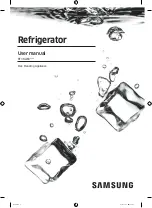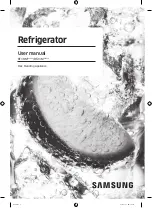
28
OPERATION
Storing Food
Food Storage Tips
•
Storing Vegetables and Fruit
The moisture left on vegetables after washing can
make them spoil faster. Wait to wash vegetables
until just before use. Leafy greens like kale or
lettuce have a limited storage life. Wrap them in
newspaper or in sealed containers to help them
stay fresh longer.
•
Do not store tropical fruits in the refrigerator.
Bananas or uncut pineapples are damaged by cold
temperatures.
•
To store dried seafood, select “Produce” for the
middle compartment and adjust the storage
temperature to “low”.
•
Store vegetables or fruit in the designated
containers to prevent them from freezing in the
middle or lower compartment.
•
Store rice or grain in the bottom compartment using
the Rice/Grain setting.
•
To avoid freezing vegetables, do not store them
using the Storage setting in the bottom
compartment.
•
To avoid freezing kimchi, do not store it using the
Meat/Fish setting in the middle compartment.
Tips for Storing Kimchi
•
Do not overfill the kimchi containers.
Allow space for the kimchi to expand as it ferments
or the contents may overflow the container. Close
the container lids completely to prevent the kimchi
from fermenting too quickly or developing yeast
mold.
Fill the container with kimchi up to the fill line and
make sure the lid is tightly closed before storing.
Cover the surface of the kimchi with plastic wrap to
extend the storage time.
•
Do not place kimchi directly into the refrigerator
compartment or store it in a plastic bag.
Use the kimchi container provided to store kimchi.
Kimchi placed directly into the refrigerator
compartment may freeze and taste off. Do not block
the air outlet inside the refrigerator with food. Doing
so could cause the food to freeze, affect product
performance, or result in electric shock or injury.
•
For best results, check on kimchi within 3 to 4
days of storing it.
If the kimchi has overflowed the container, it may
ferment too quickly and not store well.
•
Do not place foods that require different storage
conditions in the same compartment.
Select the appropriate settings for the food being
stored.
•
Be sure to use enough salt when preparing
kimchi for longer storage.
The rate of fermentation is mostly determined by
the amount of salt in the kimchi.
Small batches of mild kimchi can be successfully
stored for short periods, but add more salt if storing
large amounts for use over an extended period.
•
Use care when placing kimchi containers in the
refrigerator.
Lift the container by the handles and avoid impacts
to the bottom of the container.
(The appearance of kimchi containers may vary by
model.)
















































